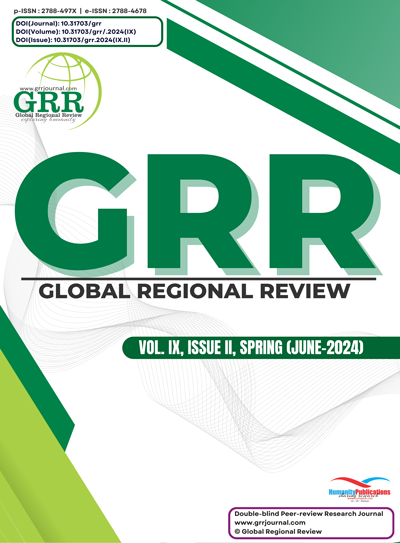
Global Regional Review
-
Address
Office #1,2, First Floor, Fazal Arcade,
F-11 Markaz, Islamabad, Pakistan. -
Email address
managingeditor@grrjournal.com
Monday to Friday 9am - 7pm -
Contact information
info@grrjournal.com, +92 332 9147618
Monday to Sunday 24 Hours
- Publishing research Since2016
- Publication FrequencyQuarterly
- Access TypeOpen Access
Global Regional Review (GRR) is published by Humanity Publications, a leading publishing house in Pakistan in research and analytics, that assists researchers in advancing research outcomes for societal benefit. To wipe out societal ills and to add the humanity by boosting up measures among the individuals of the global society. GRR intends to promote qualitative and quantitative research and findings with the help of newly emerging tools and patterns utilized in experiments, observations, interviews, analysis and surveys by encircling all major segments of regional studies and academic and research disciplines. GRR is a double-blind peer-reviewed research journal which encompasses major disciplines of regional studies i.e. economy, society, politics, geography, anthropology, art, architecture, languages, history, culture, technology and environment of Pakistan with specific reference to regional areas and powers.
The GRR Journal provides a comprehensive platform to scholars, researchers, policy makers and interested stakeholders (of regional issues and problems) for analysis, debate, innovations, transformation and sustainable developments through collaboration and membership of region specific networks. The core aims and objectives of the GRR Journal include:
- Facilitation of advance research in regional studies
- Stimulation of high quality publications focusing theoretical, empirical, applied and analytical research works
- Help in promotion of regional and global collaborative and disseminative networks among academician, social scientists, professionals, scholars and policy makers
- Propagation of the collage of diversity in research, related to regional studies.